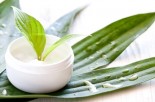There's been a recent emphasis on natural products, whether it's food or body and skincare products. When you go to the store, you may see a variety of choices with "natural" on the label.
Don't be fooled.
There is no legal definition for the word natural, and no FDA requirements to use it.
The question isn't so much whether a product is natural; but rather, is it safe?
Many products contain toxic chemicals -- even cancer-causing chemicals -- and that's pretty scary when you consider that your skin absorbs a great deal of what's applied to it.
So, how can you make sure the products you're buying are safe?
Start reading the ingredients and learn what to look for, and what to avoid.
You don't have to be a chemist, either.
Just be aware of certain words and ingredients. You should avoid anything with the word "glycol" (or its abbreviation, PEG), as well as parabens and sulphates. Synthetic fragrances and dyes should also be avoided as much as possible. The word "fragrance" is a catch-all phrase and can legally hide ingredients such as glycol.
Even products that have natural ingredients like aloe or chamomile may be hiding something, because of how those ingredients are processed. They may still contain dangerous chemicals.
Now, the FDA claims these ingredients are safe in small amounts.
But, consider this: how many products did you use today, starting from when you got in the shower (or before)? Shaving cream, body wash, shampoo, conditioner, lotion, antiperspirant, hair-styling products, cologne or perfume, toothpaste... all of these products can contain harmful ingredients and now you've layered them all on top of each other.
It doesn't stop there. Throughout the day you're exposed to toxins and chemicals in food products or in the air from pollution, you may put on more lotions or beauty products, and finally you may use a make-up remover that night.
In combination, these chemicals are all permeating your body at high levels.
The trick is doing your homework and becoming your own health advocate.
Beauty expert, David Pollock, is back on Naturally Savvy to explain why "natural" means nothing in terms of safety or efficacy, as well as truly safe options from which to choose.

Health Topics A-Z
Are Your Skincare Products Really Natural?
Guest
: David Pollock
From the Show: Naturally Savvy
Summary: There's been a recent emphasis on "natural" beauty products. Don't be fooled. There are no FDA requirements for using that word.
Air Date: 9/17/14
Duration: 10
Host: Andrea Donsky, RHN and Lisa Davis, MPH
Tagged under




